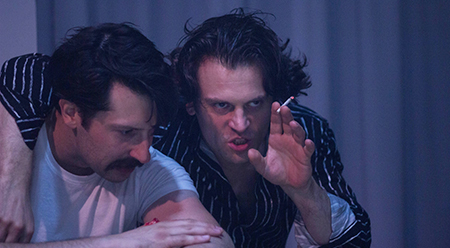 HurlyBurly by US playwright David Rabe was first staged in Chicago in 1984. The play was nominated for a Tony Award in 1985, and the following Broadway production and film incarnation featured big-name actors. How much you will get out of Q44’s production might depend on two things: How much do you enjoy fireworks, and how long do they hold your interest?
HurlyBurly by US playwright David Rabe was first staged in Chicago in 1984. The play was nominated for a Tony Award in 1985, and the following Broadway production and film incarnation featured big-name actors. How much you will get out of Q44’s production might depend on two things: How much do you enjoy fireworks, and how long do they hold your interest?
Billed as a ‘dark comedy’, much of HurlyBurly concerns a group of men trying to make a name in Hollywood in the 1980s. Roommates Eddie (Anthony Scundi) and Mickey (Will Atkinson) are casting agents trying to get projects off the ground. Their open apartment door regularly welcomes actor Phil (William Prescott) desperate to break out of his background roles, and another writer Artie (Kostas Ilias) working on his own pitches.
The quartet partakes of booze, joints, pills, and cocaine as they talk about projects and the Hollywood rat race, and they have some explosive disputes. The women of the piece, young drifter Donna (Amelia Bishop), indecisive travelling photographer Darlene (Erin Lilja), and artistic nude balloon dancer Bonnie (Nicole Melloy) are commodities having most value to the men for convenient, unthinking sex.
Whilst in the 1980s having a cocaine habit was a pastime of a certain scene, the news tells us that drugs are much more widespread in the community now. Perhaps due to this, we can’t easily see the main characters as something apart from ourselves, giving us the distance and comfort to laugh at their excesses. The production got a few titters, but certainly wasn’t in the realms of ‘comedy’ that we would expect. It is tempting to think that, being of a particular time and place, HurlyBurly cannot easily translate to the here and now.
But, I suspect that doesn’t tell the whole story. With a running time of around two and a half hours, the lack of progression of characters and attending sameness about HurlyBurly made it feel like an endurance event. I seriously thought about leaving at the interval, although selected performances after were some minor compensation. US critics have also commented on the length, such as Ben Brantley from the New York Times: “Now, as in 1984, the play could benefit from losing at least a half- hour.” Certain repetitious exchanges may feel flabby to a modern audience accustomed to a faster pace.
One serious problem is caused by performances of the male leads. In a dispute, Eddie has a line “My voice is raised for emphasis, which is a perfectly legitimate use of volume.” It’s unfortunate the play didn’t stick to this sentiment; far too much of the dialogue is shouted irritation. This sledgehammer approach robs the performances of the nuance necessary to make us believe what we observe, and become invested in it.
If Eddie is a misogynist and general misanthrope in his dealings with others, his concerns about the effects of the neutron bomb on people lack credibility. Similarly, if the characters can’t soften their machismo to show regard for each other at any point, there’s no basis for us to believe their words to be sincere after a critical event.
Essentially, HurlyBurly suffers from dramaturgical weakness. Against the pops and bangs of conflict, some events, such as the exit of the boys’ sexual plaything Donna, can occur without it mattering at all.
The title of HurlyBurly comes from a scene in Macbeth in which the three witches decide when they will meet next. Much like some modern performances of Shakespeare, the rat-a-tat speech often seemed a race through the text. Consequently, lines do not sound like the words of a real person thinking through a situation and responding spontaneously to it.
There were some bright spots of subtlety against the general onslaught. Showing a more restrained and calculating side, Atkinson’s Mickey was varied enough to surprise. His moment of transparency, exposing his transactional view of relationships, strikes sharply at a time in history when a world leader can be elected with a promise along the lines of putting ‘America First’, for example.
As sometime entertainer of Eddie and his acquaintances, Melloy’s Bonnie excelled. She was playful and confidently independent around self-important Eddie. Her unplanned return to the apartment allowed her to vent annoyance at the brittleness of her existence when testosterone-fuelled lugs like Phil don’t play nicely with their toys. It was an apt portrayal of the precariousness of life near the bottom of the social ladder at a time when a billionaire aims to take healthcare away from potentially millions of Americans, or make the unwell pay more for cover.
I can look at fireworks for a little while, but it doesn’t teach me anything about the world. If you want more from theatre than explosions, you might find that trying to filter some signal from the noise of this HurlyBurly gives little payoff for your time and trouble.
HurlyBurly
Q44 Theatre, 1st Floor, 550 Swan St, Richmond
Performance: Tuesday 2 May 2017 – 7.30pm
Season continues to 21 May 2017
Information and Bookings: www.q44.com.au
Image: courtesy of Q44 Theatre Company
Review: Jason Whyte
